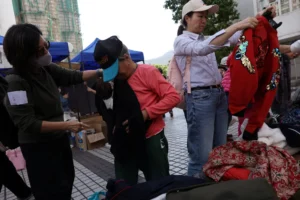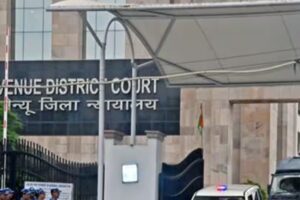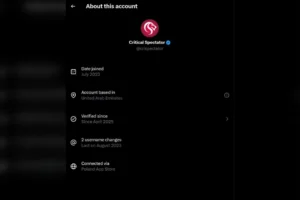
Name one thing that, in the whole of China, only exists in Xinjiang.
Answer 1: “Did you get the community office’s approval to post this?”
Answer 2: “Did you report in after coming back through the pass [i.e. back to Xinjiang from elsewhere in China]?”
I saw this post online recently, and based on my own experience, I’d say it’s completely accurate. I’ll explain a bit about that experience below. In late May last year, I went to Urumqi to lay the groundwork for a film on the region’s cultural landscape, and I’ll share a bit about my dealings with the community office when I tried to rent an apartment in the city.
To rent an apartment in Urumqi, you have to go to the community office with the landlord to register. This is a convoluted and complicated process: aside from the lease, the tenant has to submit their own personal information for inspection by the local police station. If that goes smoothly, they’ll issue an electronic ID card […], like the temporary residence permits you used to have to get in Beijing if you were an outsider. The community office will also thoroughly acquaint itself with your personal information, including occupation, marital status, family members and so on, all of which you must disclose truthfully.
Guo: OK, thanks.
[missed call]
Guo: Occupation: filmmaker (freelance). Reason for renting: shooting footage of Xinjiang’s geography and natural landscapes. Parents’ occupations and place of residence: Hunan Province, Shaoyang City, Dongkou County, Tongshan …
Cadre: Are you married?
Guo: No.
Guo: Education: Master’s degree
Cadre: What’s your parents’ monthly income?
Cadre: Send me a photo of your ID card.
If you think that this will be your only contact with them if you come from elsewhere in China to rent a place here, you’re too naïve. Your interactions with the community office will never end! First, a community cadre who’s been assigned to you will periodically appear on your doorstep to scan a code. If I recall correctly, mine came every Thursday afternoon. The code comes from an electronic device mounted on the wall inside near the door—the community cadre has to knock, because they can only scan the code if someone lets them in. As I understand it, this is a common system developed in Xinjiang for monitoring public security and managing the temporary population.
At first, I resisted, because coming from elsewhere in China, it struck me as a clear violation of my personal privacy and civil rights, and even the police have no right to act like this. But when in Rome … I had no choice but to swallow my anger and quietly submit to these periodic code-scanning visits, because although I’d tried to argue with the community cadres, it was no use. From their point of view, I was subject to their management, and the very idea that I would raise doubts about the legitimacy of their authority was inconceivable.
Cadre: Is anyone home?
[missed call]
Guo: [transcribed voice message] OK, I was here but asleep. I slept in a bit, and just saw this.
Cadre: [transcribed voice message] I’ll be right there.
Cadre: Hello?
Cadre: Are you there?
[missed call]
Cadre: I’ll come to your place today to scan the code.
Cadre: What time will you be home?
Guo: I’m here now.
Cadre: [transcribed voice message] I can’t come now, I’m off work today. I’ll come a bit later.
[11-second call]
[missed call]
[cancelled call]
Guo: I’m home.
If you’re not home when the community cadre comes to inspect, they’ll call you and message you on WeChat with a rather severe tone, like a high school teacher checking the dorms while you’re out gaming in an internet café all night. You feel like you’ve done something wrong, and deserve a scolding. The community cadre assigned to me was an elegant-looking middle-aged Uyghur woman with a permed head of beautiful blonde curls and a fashionable way of dressing. I felt her manner toward me already seemed quite polite. Sometimes when I went to southern Xinjiang or back to other parts of China, she’d phone to chide me for going away without notifying her. Our phone calls generally went like this:
Cadre: Where are you?
Me: I’m in southern Xinjiang. (Or: I’m back in Yunnan.)
Her: How come you went away without reporting it?
Me: I didn’t know travel had to be reported!
Her: Check in when you get back!
Me: OK.
Guo: [transcribed voice message] My medical insurance is paid for, and I’m in my hometown now, but will be back in town later today.
Cadre: OK
Cadre: Check in when you get back
[cancelled call]
Are you home?
[missed call]
Cadre: Are you home?
[missed call]
Guo: I’m not there, I’m back in eastern China.
Guo: What’s up?
Cadre: I need to scan your code.
Cadre: Hello?
Cadre: Are you back yet? Remember to check in.
Every time this happened, I kept my tone amiable and didn’t argue, but inwardly I was cursing, “What kind of hellhole is this, where renting an apartment means you have to report in every time you leave?!”
On the morning of February 25, I was fast asleep in that apartment I’d rented in Urumqi when suddenly there was an urgent knocking at the door. Thinking it was the usual community cadre making an inspection, I opened the door to a crowd of navy blue-uniformed personnel from the cultural tourism bureau packed into the corridor. They swarmed in, but the passageway was still full of stern-faced plainsclothes officers. They claimed that they’d received a report that my place contained a large quantity of camera gear, and I was suspected of involvement in “unauthorized filmmaking.” This was the first I’d heard of any such crime as “unauthorized filmmaking.”
I asked these law-enforcement officers whether I’d been reported by someone from the community office. If not, how else could they have known about the piles of equipment here, and my filmmaking? Had they been illegally surveilling a citizen in his own home, or monitoring his private communications? But none of them would answer my questions. They just went on looking around, grilling me, taking notes, and reporting back to their superiors.
I’ll leave it till another day to share the full, detailed story of the “unauthorized filmmaking case” cooked up by Xinjiang authorities, and my experiences and footage from traveling and shooting in the region. I’m thinking about posting a series of videos and essays on overseas social media like YouTube and Twitter, because certain authorities are sparing no effort in interfering with my free speech, personal information, and social media in order to conceal their illegal conduct in concocting the “unauthorized filmmaking case.” [Chinese]
CDT Chinese editors also archived a selection of comments on Guo’s post, some of which are translated below:
f**: You didn’t go through 7/5 [the unrest in Urumqi on July 5, 2009], so you don’t understand why they act like this.
马**: Switch to a Xinjiang IP address before you start whining.
美**: Do the actions of one bad person mean that everyone has to be controlled? Is that any way to solve the problem? Stop spreading such extreme speech, it’s not conducive to a healthy, supportive, caring community.
马孔多之路 [“Road to Macondo,” Guo’s own account]: Guo Zhenming, a traveler from elsewhere in China who received an administrative penalty for “unauthorized filmmaking,” has filed an administrative action in Shuimogou People’s Court in Urumqi.
i**: This is why I have no regrets about leaving.
赏** You took a load of camera gear to Xinjiang and didn’t register it? Genius.
P**: I have a smartphone that can record audio and video, do I need to register that?
太**: As a matter of fact, “unauthorized filmmaking” isn’t allowed anywhere. It’s come up before this case. Some directors have had all their equipment confiscated. Xinjiang’s even more sensitive. The rest of us only had three years of pandemic controls, but they’ve been under that level of control all along.
马孔多之路 [“Road to Macondo,” Guo’s own account]: There is no law requiring citizens to report the storage or use of filmmaking equipment. [Chinese]





